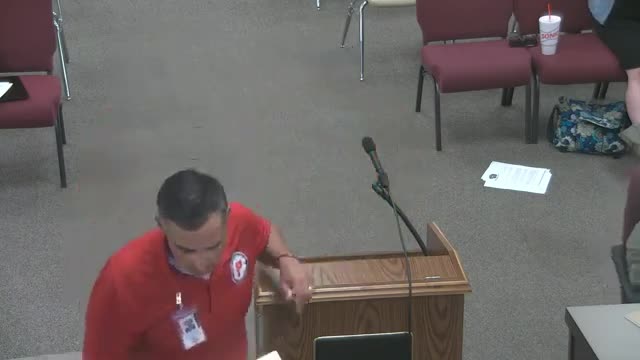Schools launch ambitious plans to boost student performance
August 16, 2024 | PLAINVIEW ISD, School Districts, Texas
This article was created by AI summarizing key points discussed. AI makes mistakes, so for full details and context, please refer to the video of the full meeting. Please report any errors so we can fix them. Report an error »

In a recent government meeting, educators from various school districts presented their strategic goals for the upcoming academic year, focusing on enhancing student performance, improving technology integration, and fostering community engagement.
One notable highlight came from a first-year teacher who shared how impactful educational programs inspired him to give back by teaching at a middle school. This sentiment underscored the meeting's emphasis on the importance of mentorship and community involvement in education.
The meeting also addressed the district's technology goals, which include assessing instructional technology software to eliminate ineffective programs and strengthen cybersecurity measures. Strategies outlined include analyzing application usage reports to correlate technology use with student performance and replenishing 500 student Chromebooks annually to ensure access to necessary resources.
Several campuses presented specific academic goals, such as North Elementary, which aims to improve STAR reading scores to 34% and math scores to 24% by 2025. Strategies include professional development for teachers and enhanced planning sessions to ensure effective instruction. Similarly, Plain Intermediate set ambitious targets to boost student performance in reading, math, and science by significant percentages, with a strong focus on professional learning communities (PLCs) to facilitate collaboration among educators.
Safety and security were also prioritized, with plans for regular door checks and vetting of visitors to maintain a secure learning environment. Additionally, schools are implementing strategies to increase parental involvement by 3% through monthly events and improved communication about school activities.
The meeting concluded with a commitment to continuous improvement, emphasizing the need for data-driven instruction and the importance of creating a supportive environment for both students and staff. As schools prepare for the new academic year, the focus remains on fostering a culture of collaboration, accountability, and community engagement to enhance educational outcomes.
One notable highlight came from a first-year teacher who shared how impactful educational programs inspired him to give back by teaching at a middle school. This sentiment underscored the meeting's emphasis on the importance of mentorship and community involvement in education.
The meeting also addressed the district's technology goals, which include assessing instructional technology software to eliminate ineffective programs and strengthen cybersecurity measures. Strategies outlined include analyzing application usage reports to correlate technology use with student performance and replenishing 500 student Chromebooks annually to ensure access to necessary resources.
Several campuses presented specific academic goals, such as North Elementary, which aims to improve STAR reading scores to 34% and math scores to 24% by 2025. Strategies include professional development for teachers and enhanced planning sessions to ensure effective instruction. Similarly, Plain Intermediate set ambitious targets to boost student performance in reading, math, and science by significant percentages, with a strong focus on professional learning communities (PLCs) to facilitate collaboration among educators.
Safety and security were also prioritized, with plans for regular door checks and vetting of visitors to maintain a secure learning environment. Additionally, schools are implementing strategies to increase parental involvement by 3% through monthly events and improved communication about school activities.
The meeting concluded with a commitment to continuous improvement, emphasizing the need for data-driven instruction and the importance of creating a supportive environment for both students and staff. As schools prepare for the new academic year, the focus remains on fostering a culture of collaboration, accountability, and community engagement to enhance educational outcomes.
View the Full Meeting & All Its Details
This article offers just a summary. Unlock complete video, transcripts, and insights as a Founder Member.
✓
Watch full, unedited meeting videos
✓
Search every word spoken in unlimited transcripts
✓
AI summaries & real-time alerts (all government levels)
✓
Permanent access to expanding government content
30-day money-back guarantee

